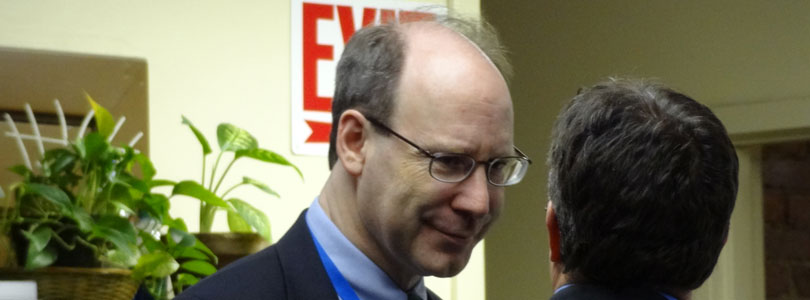The Roosevelt Society 9/26/2013 with Richard Ferruccio and Robert Walsh
Last evening, the Roosevelt Society (Teddy, not Franklin) hosted a discussion billed as a “very respectful discussion with two of the most respected union leadership figures in the state” with Rhode Island National Education Association Executive Director Robert Walsh and former Rhode Island Brotherhood of Correctional Officers President Richard Ferruccio (who is running for a current union leadership position).
Here are seven takeaways from the discussion…
1. The non-newsflash of the evening was that during the (unofficial) “Why we aren’t Republicans” phase of the discussion, the most prominent issue was that neither Robert Walsh nor Richard Ferruccio supports the idea of making Rhode Island a right-to-work state. Obviously, neither would support a Republican candidate who advocates right-to-work, and it was easy to infer that their respective unions would probably work intensely against a candidate who did (though in saying that, it should be noted that neither panelist was speaking for anyone beyond themselves in an official capacity on this particular evening).
2. If union matters were removed from the picture, Richard Ferruccio named Doreen Costa as a state legislator whose views he was sympathetic towards on a number of issues. He also mentioned Dennis Algiere and David Bates as Republicans he respected, based on his interactions when he was union President. Robert Walsh suggested that if Scott Avedisian ran for lieutenant governor, he might expect to win teacher’s union support (disclaimer above still applies) over possible Democratic nominee Daniel McKee, a less daring choice than Rep. Costa (especially given that enough support might flow in other direction to make this a wash).
3. In trying to define common ground between themselves and the Republican party, the speakers loosely settled around a theme that everyone can agree on needing to find ways to improve Rhode Island’s economy. However, when one audience member pressed both speakers to turn this into a specific program or solutions, no big idea that’s been bottled up by the state’s Democratic executive and legislative leadership and that Republicans could get behind was put forth. Mr. Walsh did suggest that it would benefit Rhode Island overall if things like local property tax-classifications and exemptions could be made uniform across the state.
4. With regards to the corrections system, Mr. Ferruccio had some specific ideas about vocational training for prisoners, and how a sensibly structured program would benefit both prisoners and public projects they could work on. He also mentioned that he had some operational ideas for cost-savings at the ACI, but that it had been difficult over the years to get the top levels of administration to listen to them.
5. Dave Talan asked Robert Walsh about school vouchers; there wasn’t any overlap between Mr. Walsh’s position and even minimal use of vouchers outside of the public system. However, Mr. Walsh was open to the idea of inserting a little more creativity into the organization of the traditional public system, for example having (allowing? encouraging?) districts to combine to offer programs that a single RI school district wouldn’t have enough students to support, but that multiple districts combined together might.
6. Also, while high-stakes testing wasn’t discussed as a separate topic, Mr. Walsh mentioned the benefit of one municipal standardization suggestion, a common school year for all Rhode Island districts, was that it would guarantee that all students taking the NECAP (or its successor) had equal classroom preparation time immediately leading up to the test. Could this be a sign that Rhode Island is really ready to move past resisting the idea of student testing in principle — something which isn’t always obvious from the headlines on the subject.
7. Finally, at one point during the evening, Mr. Walsh described himself and Mr. Ferruccio as pretty well representing the two poles of the Democratic party tent. This was best illustrated when Lee Ann Sennick asked the panelists about the immigration issue. Though they didn’t go into a lot of policy detail in their answers, Mr. Ferruccio’s position could fairly be described as that of a conservative Democrat (presuming you believe that conservative Democrats can actually exist) while Mr. Walsh’s could safely be characterized as that of a liberal Dem.
(Image: Stock photo of Bob Walsh.)



